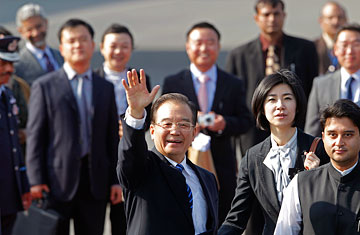
Chinese Premier Wen Jiabao in New Delhi, India, on Dec. 15, 2010
Barack Obama danced; Nicolas Sarkozy canoodled at the Taj Mahal. But when Chinese Prime Minister Wen Jiabao arrives in New Delhi this afternoon, the mood is expected to be far less euphoric.
With booming economies, both India and China have plenty to smile about, but both nations' increasing prosperity has yet to help them turn the page on past quarrels and usher in a new era of goodwill. Wen's visit comes after a particularly chilly spell in the neighbors' relationship: India is increasingly anxious about China's assertiveness in its own backyard, which has set off a new round of introspection in New Delhi about how to deal with its neighbor. "Relations have sunk to their lowest point politically since the restoration of diplomatic relations [in 1976]," says Brahma Chellaney, a professor of strategic studies at the Center for Policy Research in New Delhi. Both sides hope that Wen's visit will help smooth out some of the differences, but earlier this week in New Delhi, Zhang Yan, the Chinese ambassador to India, said it wouldn't be easy. "China-India relations are very fragile and very easy to be damaged and very difficult to repair," he said.
When the Chinese Prime Minister sits down with his Indian counterpart, Prime Minister Manmohan Singh, he may find resolving old rifts [EM] such as overlapping claims of territory along the country's 2,500 mile shared border [EM] complicated by new ones. China's relationship with Pakistan has warmed considerably of late, as Beijing assists India's longtime adversary in making infrastructure improvements, as well as pledging military aid and building nuclear reactors to deepen its ties with Islamabad, secure trade routes and counter-balance India's influence. In 2009, when China began issuing stapled visas to residents of Kashmir, India interpreted the move as an effort to discredit its sovereignty over the disputed region and a sign of Chinese meddling.
China's use of water is another rising source of tension. India's biggest rivers flow into the country from China. China is currently at work on constructing the world's largest hydroelectric dam on the Brahmaputra river, which is vital for Indian agriculture. India has agreed to treaties on water usage with its other neighbors, but China refuses to participate. This refusal to compromise underscores China's unreliability as a neighbor, says Srikanth Kondapalli, head of the Centre for East Asian Studies at New Delhi's Jawaharlal Nehru University. "While China argues for multilateralism in the international arena, it reverses that position when it comes to water," he says.
To try to overcome these political stalemates, both sides are looking to use their surging economies to rebuild relations [EM] and raise their political profiles as they have become invaluable partners for Western markets still mired in a global downturn. "There is a desire with China to get along, and I know there is such a desire in India," says Maharaja Krishna Rasgotra, former Indian Foreign Secretary. "Commerce will help soften political attitudes." Trade between India and China is expected to reach $60 billion this year up from $270 million 20 years ago, making China India's largest trading partner.
But there, too, there are issues to resolve. India's trade deficit with China is expected to top $20 billion this year. It's an asymmetry that both countries have pledged to correct, but India remains suspicious that, while China is happy to import its raw material while India buys China's refined goods, Chinese policy is standing in the way of Indian companies' exporting their own finished products. "They've turned India into an Africa-style raw material appendage," says Chellaney. "Their relations with India is lose-lose for India, win-win for China."
As Beijing builds new Indian Ocean ports and upgrades its naval capabilities to keep that supply line open to raw materials, New Delhi has grown wary of China's increasing military presence in its neighborhood. In response, India is looking East into China's backyard signing deals with Japan, Vietnam and South Korea on not just trade, but military cooperation as well. The expansion has rattled nerves on both sides, but some maintain that the fear of the other closing in is unfounded. "In today's world, encircling a big country impossible," says Rasgotra. "China is bound to come into the India Ocean. The endeavor should be to ensure that China comes in a constructive, creative and cooperative way." Resolving their differences will take creativity, yes, but, perhaps more importantly, it will take patience.
